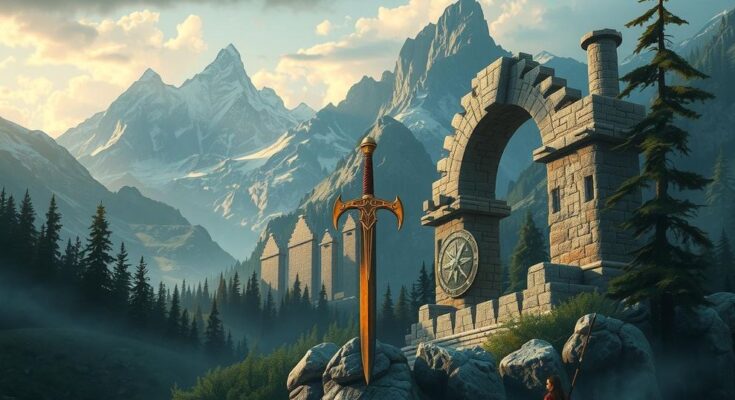The release of “Monster Hunter Wilds” has garnered over one million players on its PC launch, despite initial performance complaints. Director Yuya Tokuda and Producer Ryozo Tsujimoto discussed its success during an interview, highlighting the franchise’s evolution and iterative development. The Japanese gaming industry showcases strength amid increasing competition, with strategies focusing on broad audience engagement and adaptation to player habits.
The highly anticipated release of “Monster Hunter Wilds,” the latest installment in a renowned Japanese video game series, achieved a remarkable milestone by attracting over one million players on its PC launch via Steam. Although initial users reported performance issues, critical reviews have been predominantly favorable. In an interview with BBC Newsbeat prior to the game’s release, Director Yuya Tokuda and Producer Ryozo Tsujimoto discussed the strategies behind the game’s transition to a global phenomenon.
Originally debuting on the PlayStation 2 in 2004, the “Monster Hunter” franchise invites players to explore an environment known as The Forbidden Lands, engaging in battles against formidable monsters. Long-time players appreciate the game’s complex mechanics and cooperative gameplay, which allow friends to join forces against enormous foes. The breakout success of “Monster Hunter World” in 2018, which sold over 21.3 million copies, demonstrated the series’ potential and sparked heightened interest in subsequent titles.
Mr. Tsujimoto emphasized that “Monster Hunter Wilds” embodies the cumulative insights gained from earlier series entries, stating, “Anything that we hadn’t been doing we really tried to do with Monster Hunter World to get everything ready so that the game was ready to break through.” The comparative stability of Japan’s gaming industry, contrasted with layoffs in Western studios, allows developers to accumulate knowledge and expertise over extended periods.
Mr. Tokuda, a two-decade veteran of the series, noted that past experiences inform their latest creation. He stated, “It’s the groundwork that you create with your previous titles that you hope can inform the success of later ones.” This iterative approach is prevalent among other Japanese studios; for example, Ryu Ga Gotoku Studio consistently releases new titles while revisiting familiar themes and elements from earlier installments.
The Japanese gaming industry, once dominant, has faced increasing competition from Western developers. Yet, it has recently seen a resurgence in critically acclaimed and commercially successful releases. Last year’s Game Awards recognized Japanese games in four out of six Game of the Year nominations. Mr. Tsujimoto acknowledged that certain strategies are essential for achieving success in today’s competitive market, such as multilingual translations and broadening the audience.
Like other global developers, Japanese game creators must adapt to shifting player habits, particularly the rise of PC gaming and the escalating costs of production. Although challenges persist, Mr. Tsujimoto believes that generational advancements present both hurdles and opportunities for the industry. He noted, “I don’t think it’s necessarily the most difficult it’s ever been but there are always new challenges whenever technology leaps forward.”
As competition escalates, publishers must contend for consumer attention amidst a saturated market. Despite this, Mr. Tsujimoto stated that the team focused on creating “Monster Hunter Wilds” without fixating on external pressures. He highlighted the delicate balance of satisfying both new and long-time fans, expressing that developers must also pursue their creative visions respectfully.
In conclusion, “Monster Hunter Wilds” has exemplified the franchise’s evolution into a global gaming powerhouse, attracting a substantial player base and receiving strong critical acclaim. The iterative development model employed by Japanese studios, like that of Capcom, significantly contributes to ongoing success in the competitive gaming landscape. As these creators navigate the complexities of modern gaming, the balance between fan expectations and creative innovation remains paramount.
Original Source: www.bbc.com




